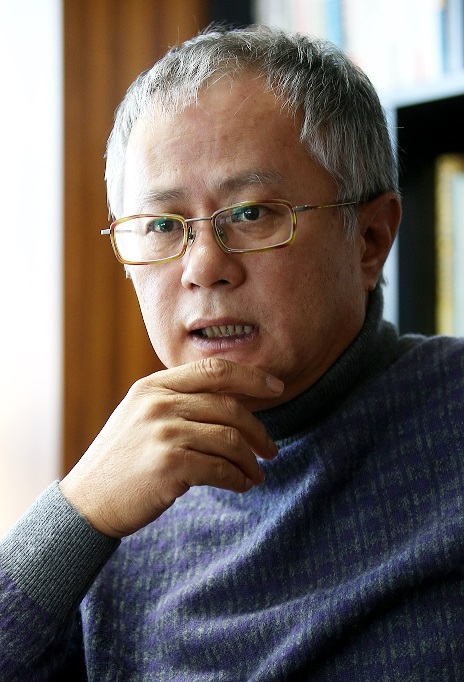On a beautiful autumn evening 17 years ago, Song Seung-hwan watched the stage curtain rise with mixed feelings ― excitement and relief that it was finally up and worry and anxiety about how the audience would react.
The show he conceived, produced and was about to present was nothing like the theater plays or musicals that were being staged in Korea at the time.
With no spoken dialogue and no well-known actors, “Nanta” had plenty of downside risks, yet it was his biggest and most ambitious theatrical undertaking.
“Once the show started, I knew (that I had hit the mark). The audience was just loving it,” Song, 58, said in an interview last week, recalling the show’s Oct. 10, 1997, premiere.
 |
| Song Seung-hwan (Yonhap) |
What followed that night is history.
After a popular run in Korea, “Nanta” made its international debut at the 1999 Edinburgh Fringe Festival, where it was named the best show.
In 2003, after playing in many cities in Europe and Asia, it finally landed on Broadway, the musical capital of the world. As the first Asian production ever to have a commercial run there, “Nanta” played for 16 months at an off-Broadway theater in New York.
Another milestone was set on Dec. 29 last year when the show greeted its 10 millionth spectator.
 |
| A scene from “Nanta” (PMC Production) |
“It almost felt like watching your own child grow. That child is now almost 18 years old,” Song, 58, said.
Better known outside Korea as “Cookin’,” “Nanta” is a nonverbal percussion show that mixes martial arts, dance and a lot of drumming and banging into a hilarious comedy.
Set in a restaurant kitchen, it revolves around four chefs and their pompous restaurant manager who gives them an order to prepare a full wedding banquet at the 11th hour.
Racing against the clock, the chefs slice, dice and chop up vegetables, turning their knives and other kitchen utensils into musical instruments and creating an energetic rhythm that is based on Korea’s traditional percussion music, samulnori.
The show is the product of the actor-director-producer’s long search for a “globally workable” theatrical format and story.
“That’s why I made it into a nonverbal show set in a kitchen. People have a kitchen in their home, whichever country they live in,” he said.
Song, who started acting on TV at age 8 and in his 20s expanded his career into theatrical directing, had harbored global ambitions for a long time.
“I literally had culture shock when I first visited New York for a TV shoot in 1983. I realized how far behind I was in the global trends. It opened my eyes,” he said.
Despite being at the height of his TV acting career, Song moved to New York to learn and absorb every aspect of its culture.
“I went to countless exhibitions, concerts and shows, and spent numerous days and nights at the Film Forum, watching old movies,” he recalled. “It was the best time of my life.”
When he came back to Seoul in 1989, he brought with him the intention of carving out a place for himself and Korea in the global theater landscape.
In the following years, Song appeared on TV dramas or commercials and saved up for his theatrical venture.
But the more he delved into producing, the clearer it became to him that to realize his vision, he needed to come up with something completely new and target global audiences from the very beginning.
“Every step that ‘Nanta’ made was Korea’s first. Nothing was easy. Everything was hard-earned,” he said.
So for 17 years and four months now since the night of its premiere, “Nanta” has been playing in Seoul and other cities. Its total revenue is nearing 200 billion won ($185 million).
Looking back on the years and all those trailblazing feats, Song feels proud and immensely grateful for the people who helped him along the way, but that doesn’t stop him from wanting more.
When asked about the production’s most recent feat of becoming the first Korean theatrical production ever to surpass the 10 million mark in ticket sales, Song said, “I look at it differently. We’ve had ‘only’ 10 million spectators so far.
“Think of the world population, or the 1.3 billion people in our neighbor China. We still have a long way to go,” he said.
To reach the 20 million or 30 million mark in ticket sales, “Nanta” would have to focus on overseas markets, he said.
Currently, the show is on an open run in three locations in Korea and in Bangkok. Over 70 percent of its spectators are non-Koreans.
“In December, we had five different productions of ‘Nanta’ playing overseas in Shanghai, Macau and Bangkok and two more on cruise ships,” he said.
At the end of January, another production will start a five-city tour of Japan. In March, a “Nanta” theater will open in the Chinese city of Guangzhou.
“If things work out as planned, the next milestone of 20 million spectators may be reached in the not-so-distant future,” he said.
By Lee Sun-young (milaya@heraldcorp.com)



